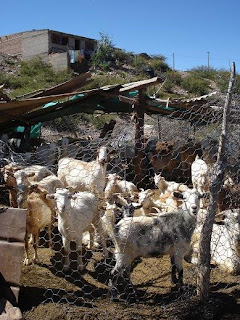In Australia we are in a recession. Money isn't as easy to come across as it was even one or two years ago when our currency almost managed parity with the US dollar. The Australian dollar has dropped in value almost 30% over the last year, which seems shocking until you consider that Iceland's Kronur lost 51% of it's value over the same period. Australia, along with Iceland, Canada, Great Britain and South Korea, has even been listed as a top destination for travel during a recession.
In Argentina, Buenos Aires in particular, there is a crisis of a different kind. Along with the economic crisis, the Argentines face a distinct lack of coins.
People need coins here to get around on public transport. The central subte (subway) is an exception, but all other buses and trains require you to pay with coins, not notes (bills). I first noticed the problem in Mendoza, when a lady gave me candy as change in lieu of coins. I was amused but the problem seemed to pop up everywhere. Fellow travelers gave me a few reasons:
- Shortages in commodities meant that the coins were at one point not worth as much as the metals they were made from. People would collect as many coins as they could and then sell them on as scrap metal.
- Bus and train companies were hoarding coins and selling them back to people with a up to 10% commission.
- The mafia (what mafia?) were hoarding the coins and selling them back to banks for more than they are worth.
Which is the correct reason?
Apparently, the bus and train companies are to blame.
People use the coins to pay for buses and trains. The companies collect the coins, and sell them on the black market for more than they are worth. Big supermarkets will unlawfully round the total in their favour, whereas most taxi drivers will round the fare in favour of the passenger. The taxi drivers either lose money by rounding down the fare, or lose money
and time finding a source of coins on the black market and then paying the commission. They prefer to save time.
Good on you, taxi drivers.
The banks are also sharing in this lucrative trade, which nets them up to 8% on their capital (Tax-free of course, as trading is done on the illegal blackmarket). The government admits that there is a legal loophole allowing the trade to occur, and until now has only been able to persecute perpetrators for 'disturbing the public peace'. Based on a national security law which appears to be the only legal instrument at hand.


No change signs have been popping up in small retailers everywhere as, at present, there is simply no other way to avoid the problem.


'The reviled "No Change" sign can be seen even at local branches of multinational banks and at state banks such as Banco Nacion. Some cynics read them as a Freudian commentary on Argentina's recurrent inability to solve its economic and political problems.' TIME. November 18 2008.
The president of Argentina, Cristina Fernandez, recently announced a new ticketing system for public transport in the nation's capital. The government are spending around $60 million on the new electronic system to combat the shortage which affects so many.
Fixing the problem means that people will no longer have to que up at banks to change 5 or 10 pesos into coins. It also means that the beggars, of which there are many, will have more luck in finding change without which they can't survive.
It means that tourists will no longer be so confused and feel compelled to write about what really is an unusual situation.
 Goats!
Goats! A child at the place where I get my food here
A child at the place where I get my food here Cacti
Cacti The monument overlooking the town
The monument overlooking the town  Around Humahuaca
Around Humahuaca Damian at work making jewelry before dinner
Damian at work making jewelry before dinner





 No change signs have been popping up in small retailers everywhere as, at present, there is simply no other way to avoid the problem.
No change signs have been popping up in small retailers everywhere as, at present, there is simply no other way to avoid the problem.
 'The reviled "No Change" sign can be seen even at local branches of multinational banks and at state banks such as Banco Nacion. Some cynics read them as a Freudian commentary on Argentina's recurrent inability to solve its economic and political problems.' TIME. November 18 2008.
'The reviled "No Change" sign can be seen even at local branches of multinational banks and at state banks such as Banco Nacion. Some cynics read them as a Freudian commentary on Argentina's recurrent inability to solve its economic and political problems.' TIME. November 18 2008.


















